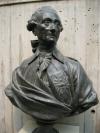
Louis-Jules Mancini-Mazarini
Born in December 16, 1716 / Died in February 25, 1798 / France / French
Louis-Jules Mancini-Mazarini poet from France was born on December 16, 1716, had 81 years and died on February 25, 1798. Poems were written mainly in French language. Dominant movement is academy francaise.
Biography
Louis-Jules Barbon Mancini-Mazarini, duc de Nivernais was a French diplomat and writer. He was the sixth member elected to occupy seat 4 of the Académie française in 1742. In English, his title is written, the Duke of Nivernais.[1]
Mancini-Mazarini was born in Paris, son of Philippe Jules François Mancini, duc de Nevers from 1707 to his death, and Maria Anna Spinola, who had married in 1709. Philippe Jules François was a great-nephew of Cardinal Mazarin. He was a great grandson of the great beauty Gabrièlle de Rochechouart de Mortemart, sister of Madame de Montespan.
Mancini-Mazarini was educated at the Collège Louis le Grand, and married at the age of fourteen. He served in the campaigns in Italy (1733) and Bohemia (1740), but had to give up soldiering on account of his weak health. He was subsequently ambassador at Rome (1748–1752), Berlin (1755–1756) and London, where he negotiated the treaty of Paris (10 February 1763). From 1787 to 1789 he was a member of the Council of State. He did not emigrate during the Revolution, but lost all his money and was imprisoned in 1793. He recovered his liberty after the fall of Robespierre, and died in Paris on 25 February 1798.
In 1743 Mancini-Mazarini was elected to the Académie française for a poem entitled Délie, and from 1763 he devoted the greater part of his time to the administration of the duchy of Nevers and to belles-lettres. He wrote much and with great facility; but his writings are generally considered to be of little value, his Fables being his best productions. His Œuvres complètes were published in Paris in 1796; an edition of his Œuvres posthumes was brought out in Paris by Nicolas-Louis François de Neufchâteau in 1807, and his Correspondance secrète was published in Paris by de Lescure in 1866.





